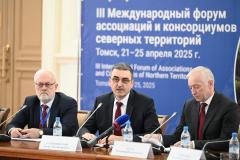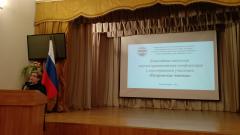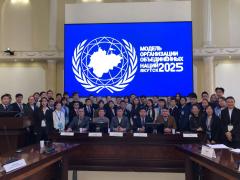
The eighth day of the 29th session of the 29th Conference of the Parties (COP29) of the United Nations Framework Convention on Climate Change (UNFCCC) is taking place today, 19 November in Baku, Azerbaijan.
Events at the Arctic Pavilion opened with a session of the International Association of Students in Agricultural and Related Sciences, discussing climate change adaptation strategies and mitigation approaches to reduce the loss of biodiversity in the oceans. The association operates globally, speakers also came from different countries: Morocco, USA, Zambia, Republic of Korea, India. With the organiser of the session - Kevin Valencia agreed to establish communication to develop cooperation. The representatives of the Association are interested in contacts in the Northern regions, organise various events in different countries and are ready to promote the Northern Forum, agricultural universities at the international level.

A panel discussion «Role of financial intermediaries for sustainable development» also took place today. The global economy is considering the benefits of new payment systems that are fast, low cost, transparent, secure and inclusive. The creation of a new global financial system is one of the main priorities for the national security of individual states and the world in general. There is a need to share the experience in the area of payment infrastructure, including the unification of cross-border payment systems, as this would strengthen cooperation and promote dialogue on payment instruments in order to facilitate stable trade and investment flows between states. Multilateral financial institutions and international organizations should play a constructive role in building global consensus on economic policy issues and preventing systemic risks of recession and financial fragmentation.

There was a very interesting lecture by Northern Forum Goodwill Ambassador Paul Fuhs from Alaska, who reflected on the future of humanity in terms of Arctic energy and food production. This lecture is very well adapted for educational purposes. Many listeners were interested to learn that 30% of the world's energy is used for food production, with the Arctic countries mostly switching to renewable energy. For example, Iceland 100%, Norway 98%, and Russia 21%. The cyclicality of temperature rise about every 100,000 is known and we are rather approaching a peak and then a cooling will come quite quickly, but not for such a long period.Then do we need to think about climate change if it is cyclical and cannot be avoided? Surely humanity is only now starting to learn how to adapt to them at different historical moments and predict them to restructure economies and ways of life.

The Association of Polar Early Career Scientists held a panel discussion on bridging communication gaps in Arctic co-operation. The polar regions play an important role in regulating the Earth's climate, but their complexities and challenges are often misunderstood by the public and policy makers. And we absolutely agree on this! The discussion addressed the urgent need for better communication and co-operation in Arctic and Antarctic research. The session will continue in the Cryosphere Pavilion on Thursday and the Executive Director of the Northern Forum has been invited as a guest speaker. The aim of these sessions is to inspire a broader, more connected approach to polar research and policy, emphasising the role of collaboration, innovation and advocacy in protecting these vital regions.

In October and early November, Colombia hosted COP16 on biodiversity, and the Baku conference will be followed by COP on desertification in Riyadh. Alexander Shestakov, leading expert of the Centre for Marine Research of MSU, Viktoria Elias, Director of Environment of the Nature and People Foundation, moderated by Sergey Rybakov, shared the results of the work in Colombia and future perspectives, building on the SDGs adopted in Rio de Janeiro in 2015.

The last event of the day, «Global Climate Action Summit: Empowering Youth, Promoting Equality, and Driving Innovation» was organised by the International Carbon Neutrality Industry Research Organization. The session is dedicated to supporting youth, equality, promoting innovation.
On November 11-22, the Northern Forum is hosting the first-of-its-kind Arctic Pavilion at the UN Climate Change Conference (COP29) in Baku, Azerbaijan. The general partner of the Arctic Pavilion is the Melnichenko Foundation, the youth partner is the BRICS Youth Energy Agency. More info: https://arcticpavilion-cop.org
Watch live-streaming of all sessions on the Northern Forum Youtube channel.



























